About The College Insights
2025 Second Century Society Induction
Since 2019, the Second Century Society recognizes generous benefactors who have made lifetime gifts totaling 1 million dollars or more of philanthropic impact.
John J. Rocco, MSFS, CLU®
The life and career of John J. Rocco, MSFS, CLU®, stands as a testament to a lifelong commitment to service, integrity, and leadership. While attending Boston University, he joined the Air Force ROTC and later served his country as a Captain in the U.S. Air Force and a reservist in the Air National Guard. Following his military service, Rocco dedicated an extraordinary 69 years of his career to New York Life Insurance Company and founded the Rocco Insurance & Financial Group. Over the decades, he helped thousands of individuals and families secure their financial futures through expert guidance and unwavering care.
An undisputed leader in the financial services profession, Rocco was deeply committed to continuous professional development. He earned his Chartered Life Underwriter® (CLU®) designation and, at the age of 63, received his Master of Science in Financial Services (MSFS) degree from The American College of Financial Services. His relationship with The College was one of enduring support. He participated in key initiatives including the 21st Century, One Person, and Invest in the Future campaigns, and served as both Alumni Council Emeritus and Foundation Board Trustee Emeritus.
His remarkable contributions were recognized through numerous accolades, including Life and Qualifying Membership in the Million Dollar Round Table and The College’s prestigious President’s Award in 2009.
Rocco was happily married for over 65 years to his treasured wife Joan, who predeceased him in the fall of 2024. She always stood behind him and supported him throughout his career and was the wind beneath his sails. He is survived by his three sons, John Jr., David, and Christopher, and seven adored grandchildren. Beyond his love for his family, friends, and work, he always found tranquility and peace on the ocean on his boat, The Whole Life.
Rocco passed peacefully on March 22, 2025, and is deeply missed by all who knew him. His impact endures through his work, friendships, family, and generosity. The College is proud to carry on the legacy of John J. Rocco and is honored to induct him posthumously into the Second Century Society.
More From The College
Continue to support our mission and the future of financial services
Learn more about the 2025 President’s Dinner honorees and current updates from The College.
About The College Insights
2025 Alumni Hall of Fame Induction
Celebrating its 20th anniversary, the Alumni Hall of Fame award recognizes distinguished alumni association members who have given back to The College and their communities through time, talent, and treasure.
Rodger Johnson, CLU®, ChFC®, CAP®, CFP®, MSFS, RICP®
A native East Texan, Rodger Johnson has been a leader in the financial services profession since 1978. He earned a Chartered Life Underwriter® (CLU®) designation from The American College of Financial Services and later earned additional degrees and certifications, including the Chartered Financial Consultant® (ChFC®), Chartered Advisor in Philanthropy® (CAP®), Certified Financial Planner® (CFP®), Master of Science in Financial Services (MSFS), and Retirement Income Certified Professional® (RICP®).
As a lifelong advocate for continuing education, Johnson has facilitated CAP® classes in Tyler and Dallas, TX, helping over 250 business leaders and clients alike deepen their understanding of philanthropy. His passion lies in guiding clients through The Bigger Conversations™, transformative dialogues to expand both the mind and heart, while opening doors to empowering new perspectives. These conversations make technical planning more strategic and deeply personal, while motivating clients to think boldly, act with purpose, and pursue greater possibilities.
In addition to serving clients, Johnson is a nationally recognized speaker on the topics of estate and business succession planning. Committed to giving back, he serves as president of the New York Life Advisory Board of Directors, vice chairman of the American College’s President’s Advisory Board, and vice chairman of advancement for The East Texas Crisis Center.
Johnson remains deeply engaged at Grace Baptist Church in Tyler, Texas, serving on the advisory council, teaching Sunday school, and leading as music director. He and his wife Crystal have been married since 1978 and live in Bullard, TX, where they enjoy spending time with their children and grandsons. The College is proud to induct Rodger Johnson into the Alumni Hall of Fame and recognize his lifetime of service.
More From The College
- Continue to support our mission and the future of financial services
- Learn more about the 2025 President’s Dinner honorees and current updates from The College.
About The College Insights
2025 Huebner Gold Medal
Named for Solomon S. Huebner, a financial services, education, and insurance pioneer who founded The College in 1927, the Solomon S. Huebner Gold Medal recognizes the leaders whose support and dedication make The College's mission a reality. Fifty years since its inaugural presentation in 1975, the Huebner Gold Medal remains the highest honor bestowed by The College.
Randall "Rand" H. Harbert, CLU®
[Body] An accomplished business leader, executive coach, and lifelong learner, Randall (Rand) H. Harbert has led a distinguished career in marketing, sales, and agency leadership spanning more than three decades. He earned his bachelor's degree from the University of Central Missouri in 1985, an MBA from Webster University in 1988, and completed the General Management Program at Harvard Business School in 2001. He also holds the Chartered Life Underwriter® (CLU®) designation from The American College of Financial Services.
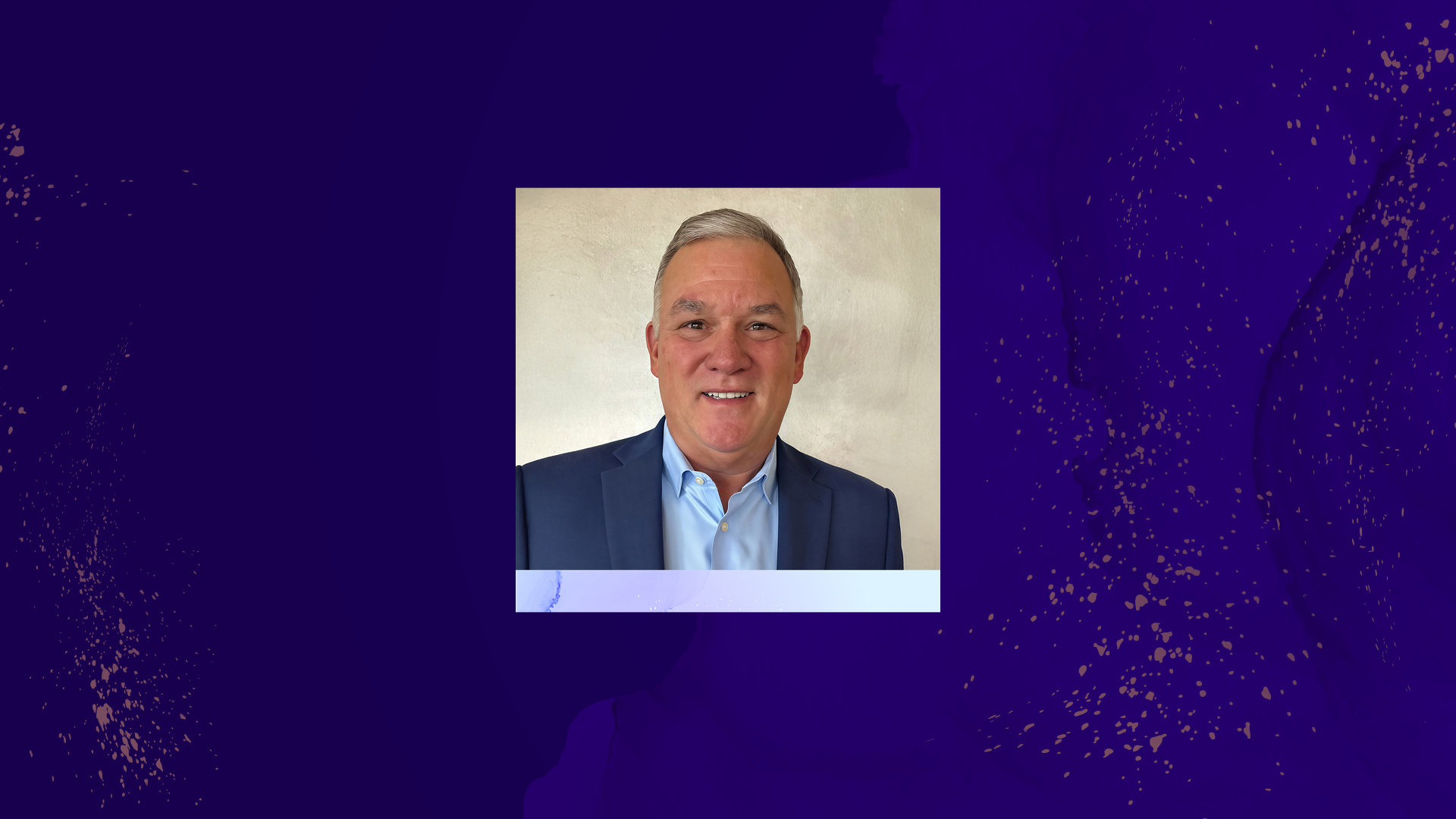
Harbert began his career in marketing with H.J. Heinz and Marion Merrell Dow, before joining State Farm as an agent in 1992. He rose through the ranks to hold key leadership roles, including president and chief executive of State Farm General Insurance Company. Most notably, he served as executive vice president and chief agency, sales and marketing officer of State Farm Mutual Insurance Company from 2011 to 2022, overseeing a bold transformation of the State Farm brand. He revitalized the iconic “Like a Good Neighbor” campaign and reintroduced the “Jake from State Farm” character. His innovative leadership earned national recognition, including Ad Age’s 2020 Marketer of the Year and inclusion on Business Insider’s “50 Most Innovative CMOs” list.
Today, Harbert channels his experience into coaching and mentoring high-performing executives and teams, helping them drive impact and navigate complex challenges. He currently serves on the board of directors for Hagerty and State Farm Life Company, and has previously held board roles with State Farm Fire Company, State Farm General Company, Teach For America, the California Business Roundtable (where he served as Chairman), the California Chamber of Commerce, the Reagan Legacy Foundation, Eureka College, and the University of Central Missouri Foundation. At The College, Harbert served as a trustee for 11 years and now serves on the President’s Advisory Council. He has been a member of the President’s Circle and Legacy Society and has supported The College’s annual fund, the American College Center for Women in Financial Services, and the Conference of African American Financial Professionals (CAAFP).
Rand and his wife Kelly reside in Texas and are proud parents of three as well as grandparents to a granddaughter and two grandsons. The College is proud to award Rand Harbert its highest honor, the Solomon S. Huebner Gold Medal, in recognition of his extraordinary career and lifetime of service.
More From The College
- Continue to support our mission and the future of financial services
- Learn more about the 2025 President’s Dinner honorees and current updates from The College.
About The College Insights
2025 Presidents Award
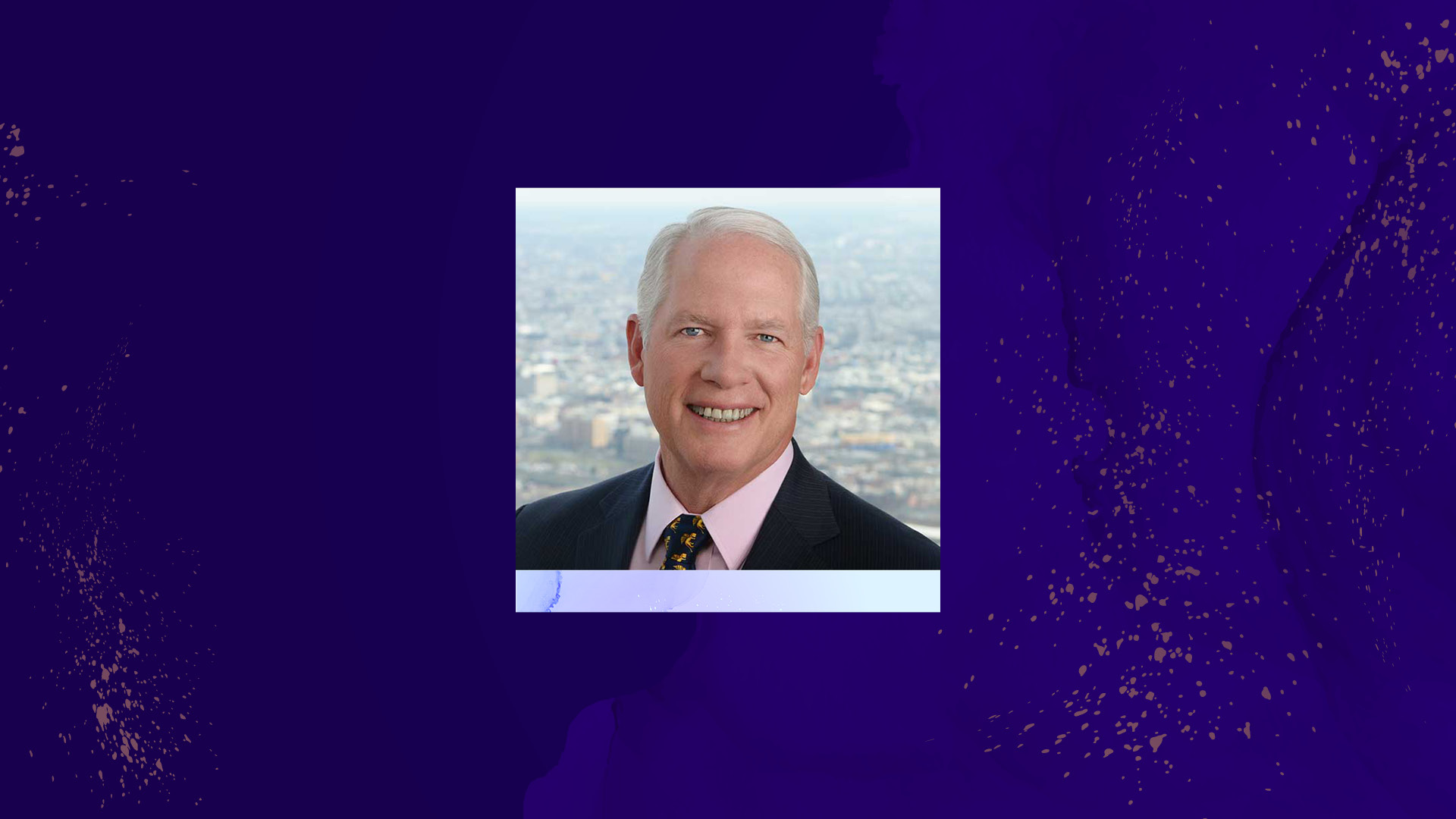
Conferred by The College’s President and CEO, the President’s Award honors the extraordinary benefactors and volunteers, whose generosity and leadership embody The College’s mission.
Thomas H. Harris, CLU®, ChFC®, FLMI
Tom Harris is the recently retired president of life insurance and annuities for The Penn Mutual Life Insurance Company. He was appointed to this position in 2022 after serving as executive vice president and chief distribution officer since 2013.
Harris was responsible for life insurance and annuity product development, marketing and servicing of the company’s industry-leading life and annuity solutions and Penn Mutual’s national distribution channels, including 1847Financial (affiliated), Independence Financial Network, and Strategic Alliances.
His career spans more than 40 years in all facets of distribution leadership. Prior to joining Penn Mutual in 2009, Harris served as senior vice president of Prudential Select Brokerage, where he was responsible for growing life insurance sales through independent producers.
Harris received a bachelor’s degree in actuarial science from Temple University. He holds Chartered Life Underwriter® (CLU®), Chartered Financial Consultant® (ChFC®) and Fellow, Life Management Institute (FLMI) designations. He is active in the industry as a member of Finseca, the American Council of Life Insurers (ACLI), Women in Insurance and Financial Services (WIFS), and National Association of Insurance and Financial Advisors (NAIFA). He is a member of the advisory council for the Center for Military and Veterans Affairs at The American College of Financial Services.
More From The College
- Continue to support our mission and the future of financial services
- Learn more about the 2025 President’s Dinner honorees and current updates from The College.
About The College Insights
2025 Presidents Dinner Recap

The American College of Financial Services is committed to delivering the highest-quality applied education to the professionals entrusted with the public’s financial well-being. The annual President’s Dinner highlights new and exciting developments at The College, while recognizing the generous supporters, including President’s Circle and Legacy Society members, whose contributions help drive our mission forward.
Awards Presentation
Each year, the President’s Dinner features a series of award presentations recognizing financial services leaders whose passion and commitment make a meaningful impact on The College and financial services profession.
Congratulations to this year’s recipients:
Huebner Gold Medal: Randall H. Harbert, CLU®
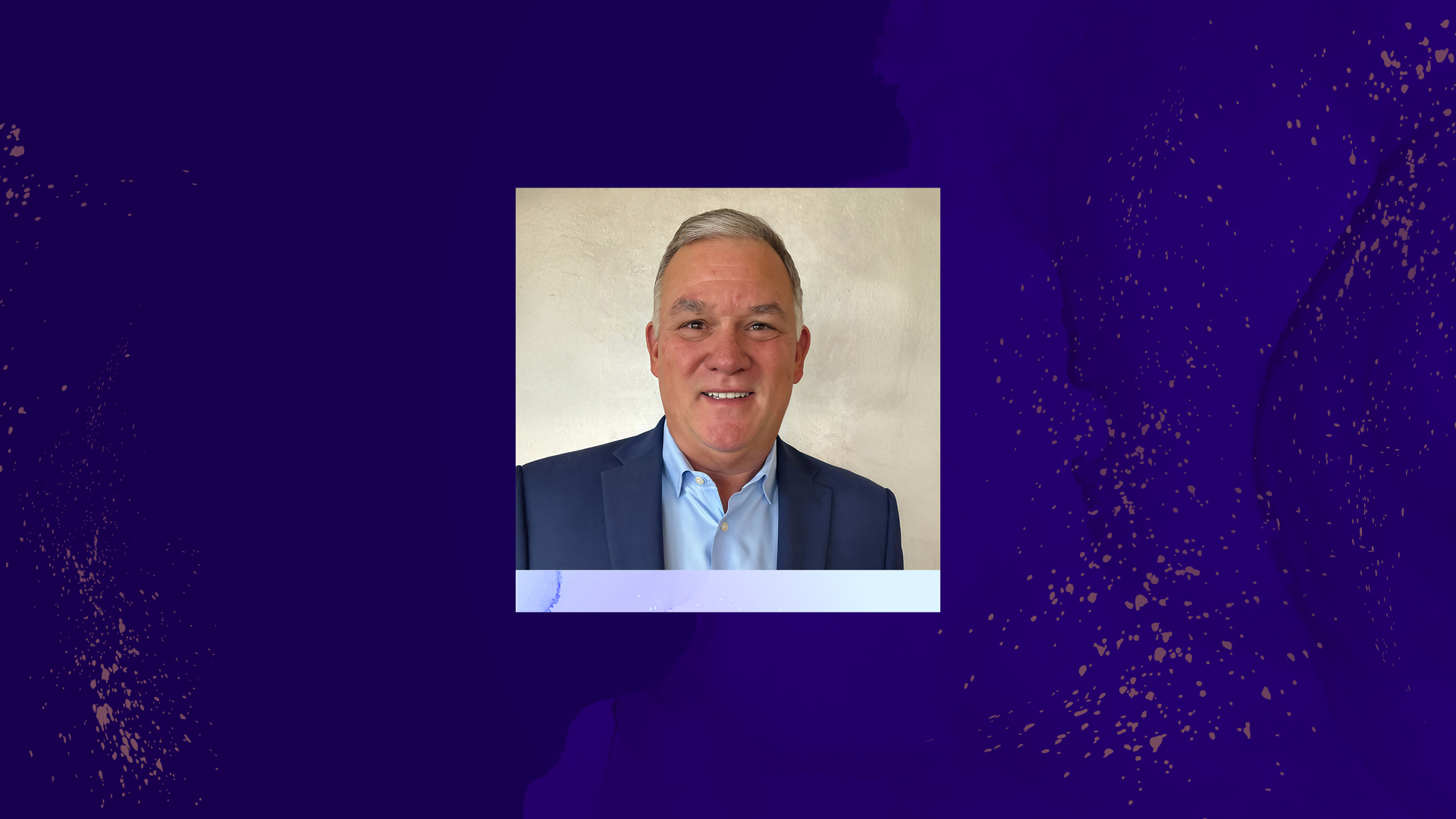
Randall (Rand) H. Harbert, is an accomplished business leader, executive coach, and lifelong learner with a distinguished career in marketing, sales, and agency leadership spanning more than three decades.
Harbert’s career includes leadership roles at H.J. Heinz, Marion Merrell Dow, and State Farm, where he served as executive vice president and chief agency, sales, and marketing officer from 2011 to 2022. He led the transformation of the State Farm brand, revitalizing the “Like a Good Neighbor” campaign and reintroducing “Jake from State Farm,” earning national recognition including Ad Age’s 2020 Marketer of the Year.
Today, Harbert mentors executives, serves on multiple boards, and has long supported The College as a trustee, advisory council member, and donor. The College honors him with the Solomon S. Huebner Gold Medal for his lifetime of achievement and service.
President’s Award: Thomas H. Harris, CLU®, ChFC®, FLMI
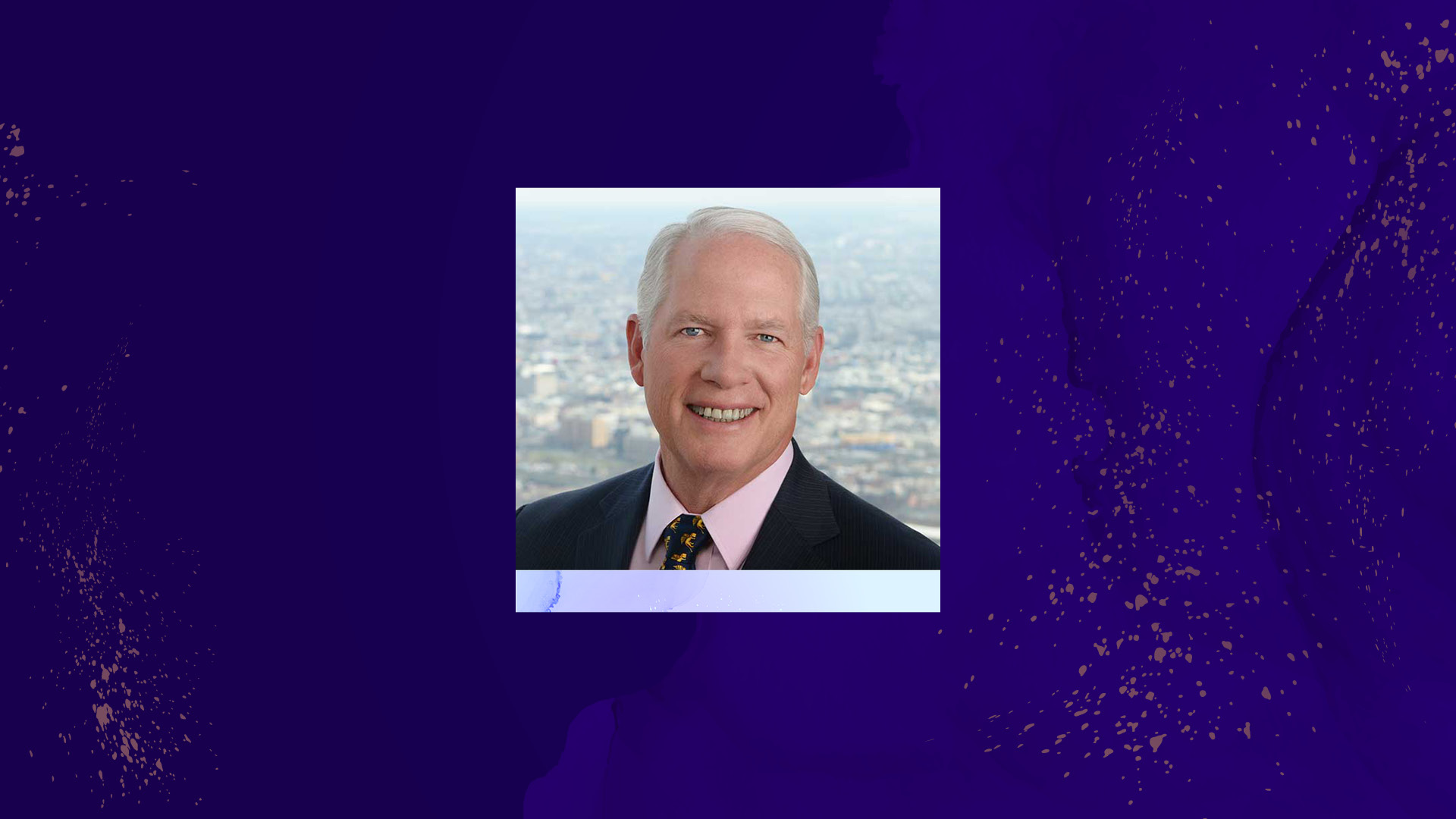
Tom Harris is the recently retired president of life insurance and annuities for The Penn Mutual Life Insurance Company. He was appointed to this role in 2022 after serving as executive vice president and chief distribution officer since 2013. In these roles, Harris oversaw life insurance and annuity product development, marketing, servicing, and Penn Mutual’s national distribution channels, including 1847Financial, Independence Financial Network, and Strategic Alliances.
With a career spanning more than 40 years in distribution leadership, Harris previously served as senior vice president of Prudential Select Brokerage, driving life insurance sales through independent producers. He remains actively engaged in the industry as a member of Finseca, the American Council of Life Insurers (ACLI), Women in Insurance and Financial Services (WIFS), and the National Association of Insurance and Financial Advisors (NAIFA). Harris also serves on the advisory council for the Center for Military and Veterans Affairs at The American College of Financial Services, sharing his expertise and supporting the next generation of financial professionals.
Alumni Hall of Fame: Rodger Johnson, CLU®, ChFC®, CAP®, CFP®, MSFS, RICP®
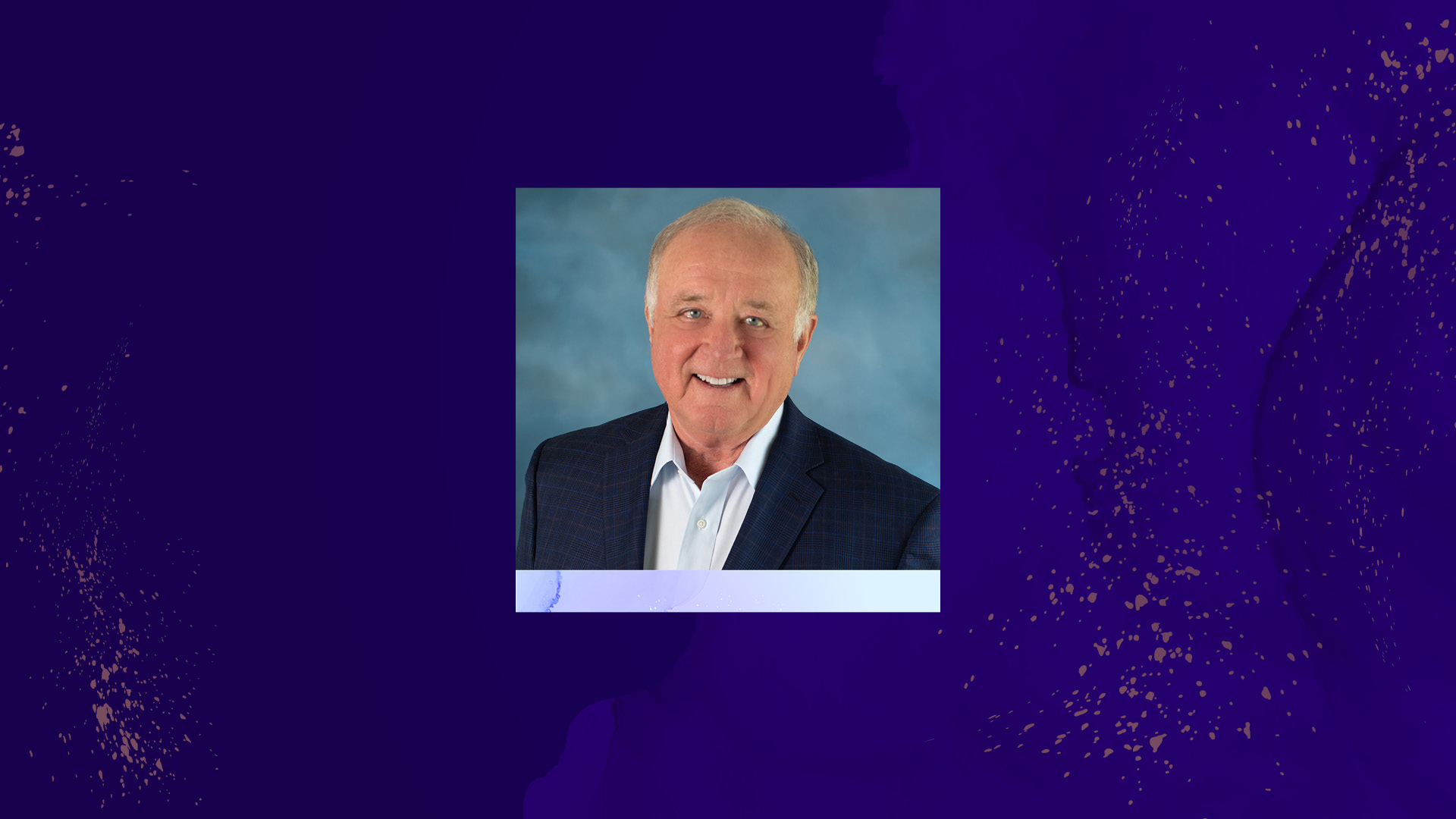
A native East Texan, Rodger Johnson has been a leader in the financial services profession since 1978. A lifelong advocate for continuing education, he has facilitated CAP® classes in Tyler and Dallas, Texas, helping more than 250 business leaders and clients deepen their understanding of philanthropy. His passion lies in guiding clients through The Bigger Conversations™, transformative dialogues that make technical planning strategic and personal, while inspiring bold thinking, purposeful action, and new possibilities.
In addition to serving clients, Johnson is a nationally recognized speaker on estate and business succession planning. Committed to giving back, he serves as president of the New York Life Advisory Board of Directors, vice chairman of the American College’s President’s Advisory Board, and vice chairman of advancement for The East Texas Crisis Center.
The College proudly inducts Rodger Johnson into the Alumni Hall of Fame, honoring his lifetime of service, leadership, and dedication to advancing the financial services profession.
Second Century Society: John J. Rocco, MSFS, CLU® (posthumously)

John J. Rocco, exemplified a lifelong commitment to service, integrity, and leadership. He dedicated 69 years of his career to New York Life Insurance Company and founded the Rocco Insurance & Financial Group, helping thousands of individuals and families secure their financial futures through expert guidance and care.
A respected leader in the financial services profession, Rocco earned his Chartered Life Underwriter® (CLU®) designation and, at age 63, his Master of Science in Financial Services (MSFS) from The American College of Financial Services. He maintained a lasting relationship with The College, supporting initiatives such as the 21st Century, One Person, and Invest in the Future campaigns, and serving as Alumni Council Emeritus and Foundation Board Trustee Emeritus. His contributions were recognized through numerous accolades, including Life and Qualifying Membership in the Million Dollar Round Table and The College’s President’s Award in 2009.
Rocco passed peacefully on March 22, 2025, and is deeply missed by all who knew him. His impact endures through his work, friendships, family, and generosity. The College is proud to carry on the legacy of John J. Rocco and is honored to induct him posthumously into the Second Century Society.
Women Working in Wealth℠: Michele Matchett Godfrey MBA, ChFC®, AFC®
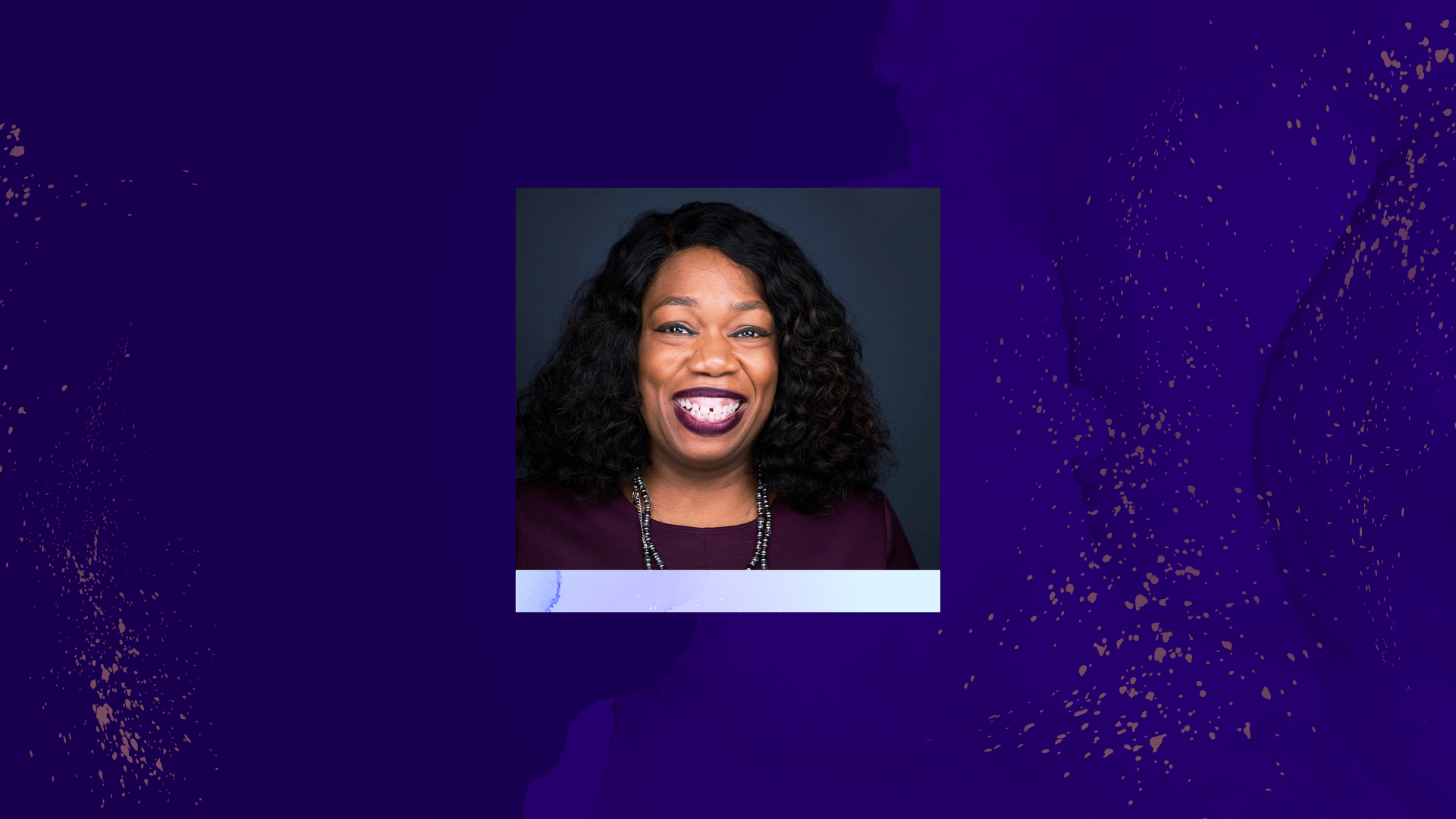
Michele Matchett Godfrey is a transformative leader with a distinguished record of enhancing financial health across military, corporate, and banking sectors. As business development manager for higher education initiatives at JPMorgan Chase, she leads strategic partnerships and programs that assess and advance financial health solutions for students, faculty, and staff across diverse communities. A recognized subject matter expert, Godfrey aligns programming, shares best practices, and addresses economic stability challenges.
Her commitment extends nationally and locally through nonprofit and policy organizations, including the Financial Literacy Education Commission (FLEC), Project REACH, NEFE, and the Financial Health Network. A certified Accredited Financial Counselor® (AFC®), she previously managed financial literacy and career programs for Marine Corps Community Services, served as a community affairs specialist at the FDIC, and directed financial readiness programs for the U.S. Army Garrison. She also mentors military spouses, helping them navigate personal and professional goals. Godfrey’s work reflects a career dedicated to financial empowerment, education, and lasting societal impact.
NextGen Financial Services Professional Award: Aaron Gose, ChFC®, FSCP®, RICP®, WMCP® & Mariana Llamas, CFP®

Aaron Gose is the principal financial advisor at Engineer’s Financial Group LLC, specializing in clients in the engineering market. He studied civil engineering and finance at the University of Colorado, Denver, and spent nearly six years as a HUNCH Engineer with NASA and as a civil engineer with the Mile High Flood District. His love for problem-solving led him to a career in finance in 2021. Gose holds multiple designations from The American College of Financial Services and is FINRA Series 6, 7, 63, and 65 licensed. In his free time, he serves as a firefighter with Snohomish County Fire District #5, holding Firefighter 1 and Hazmat certifications.
Mariana Llamas is an associate financial planner at Brio Financial Group with over eight years of experience helping non-traditional individuals and families align their financial plans with their life goals. A first-generation Mexican immigrant, she brings cultural fluency and empathy to her work, empowering clients and peers through financial education and community engagement. Llamas has led financial literacy workshops for underserved communities, mentored first-generation college students, and advised industry leaders on inclusive hiring. She served two years on The American College of Financial Services’ NextGen Task Force and actively fosters connection and development within the profession, driving meaningful change and promoting equity in financial planning.
Venue
A sophisticated staple of Center City, Four Seasons Hotel Philadelphia at Comcast Center is located in Philadelphia’s tallest building, complete with unobstructed city views, luxury hotel rooms, and access to conference and event spaces. Guests were treated in high style as The College celebrated the accomplishments of distinguished honorees.
The President
President and CEO of The College George Nichols III, CAP®, presided over the 2025 President’s Dinner. He reflected on a transformative year while looking ahead to the future, including The College’s 100th anniversary in 2027. George acknowledged the leading volunteers, donors, and friends whose support makes The College’s work possible. He reminded guests that the phrase “Don’t let the old man in” takes on new meaning as we approach our centennial, emphasizing that we are as young as we feel. It was an inspiring evening, reminding all in attendance that The Future is Now.
More From The College
- Continue to support our mission and the future of financial services
- Learn more about our Centers of Excellence
- Stay in touch about current updates from The College
Ethics In Financial Services Insights
How Financial Advisors Can Foster Client Trust

In “How Financial Advisors Can Foster Client Trust,” Azish Filabi, JD, MA, managing director of the Center for Ethics in Financial Services, and Domarina Oshana, PhD, senior director of research and operations, draw from the Center’s Voices from the Field: Ethics Challenges in Financial Advisory Practices study and prior multi-pronged trust in financial services research to share research-based strategies for strengthening advisor and client relationships. They explore how advisors can simplify complexity, recognize conflicts of interest, understand client needs hierarchies, and balance power dynamics to foster trust.
The article highlights the Center’s Trust Certificate Program in which advisors are educated on the science of trust — that is, the ecosystem dynamics that influence advisor behaviors. Through this program, advisors learn trust-building strategies that strengthen ethical decision-making and support clients’ long-term financial well-being.
Filabi and Oshana note that by focusing on ethical awareness and simplifying complex ideas, advisors can strengthen trust and deliver lasting value to their clients.
More on Building Client Trust:
- Read the full Rethinking65 article to explore practical frameworks included in the Center’s Trust Certificate Program to equip to foster advisor-client trust.
- Download the full Voices from the Field report to explore findings from this research and gain critical insights on how financial advisors navigate trust in practice management.
- Learn more about how the Center’s Trust Certificate Program equips financial services professionals with the tools needed to overcome barriers to trust and develop skills to address future complexities as a resilient, effective leader.
Series 66
Series 66 License Exam Prep Program
The Series 66 License Exam Prep program is 100% online, interactive, and powered by Achievable’s adaptive learning platform.
About The College Insights
Meet the 2025 FinServe Network Ambassadors
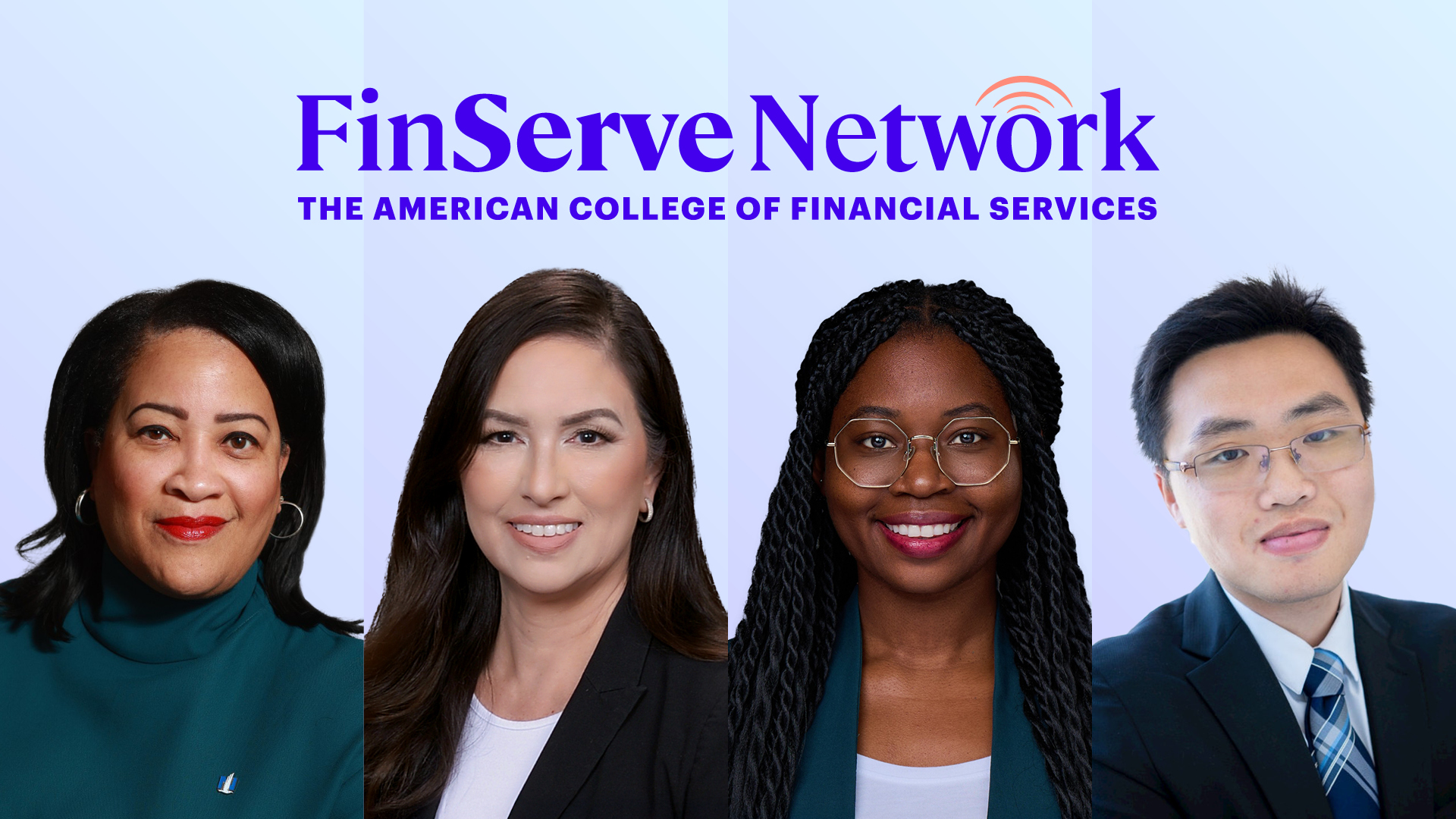
Launched in 2023, the FinServe Network now includes nearly 30 financial services professionals representing a cross-section of leaders and advocates in the industry, dedicated to amplifying The College’s mission, values, and programs. The ambassadors of the FinServe Network represent the unique and diverse landscape of financial services, and they continue to multiply our impact and magnify your successes as we move toward our second century of excellence.
Introducing Our 2025 FinServe Network Inductees
The four new members of the FinServe Network bring with them a range of professional expertise in specialized areas including insurance and risk management, tax planning, philanthropic planning, retirement planning, and more.
Angela Davis is vice president of Nationwide Financial’s internal sales and service teams based in Dublin, OH. With over 35 years of insurance experience, she is celebrated for her collaborative and caring leadership style, and her strategic and visionary leadership. She oversees an 800+ person team, managing all aspects of internal sales and service operations, and providing essential support to financial professionals and members across annuity, life, and retirement solutions emerging markets.
Dominique Langerman, MPA, CAP®, is a regional vice president for community at Mercer Advisors. She is a passionate advocate for philanthropy and wealth management and brings extensive expertise to her work with business owners, foundations, endowments, and nonprofits. She is dedicated to aligning financial strategies with clients’ philanthropic aspirations, connecting them with tailored advisory services and resources to achieve lasting impact and financial success. She leverages her expertise to craft impactful giving strategies, such as donor-advised funds, private foundations, and charitable trusts, that optimize tax efficiency and align with her clients’ values.
Anna Mpinga, FSCP®, MS, is a financial services professional with New York Life Securities, LLC in the Dallas/Fort Worth area. Originally born in Tanzania, she came to the U.S. as a refugee in 2004, carrying resilience and drive that continue to shape her journey. She has a passion for empowering individuals and families to thrive financially through strategic planning with a focus on mindset and financial literacy. Her work is rooted in empathy, integrity, and a commitment to growth and financial literacy as a tool for empowerment.
Siu Lung (Philip) Wu, EA, NSSA®, CTRS, TPCP®, AFSP, CETF®, is the owner and chief tax accountant of Primera Accounting Services in Chicago, IL, overseeing all areas of tax compliance, resolution, and forward-looking tax planning. He leads his firm with a strong emphasis on professional ethics, client education, and practical strategies that empower clients to make informed, responsible financial decisions. His work often bridges the gap between complex tax law and real-life application, helping clients reduce unnecessary liabilities while staying aligned with their personal and business goals. He is recognized for his methodical approach, combining analytical depth with a client-first philosophy rooted in trust and transparency.
About the FinServe Network
The FinServe Network launched in 2023 with the mission to identify outstanding members of the financial services profession and The College’s community and empower them with the resources, platform, and knowledge to spread the word about our mission, values, and programs to their professional networks and highlight the power of applied financial knowledge in their communities. Members are selected following a careful screening process that evaluates their credentials, commitment, accomplishments, and platform based on their willingness to act as advocates for our vast alumni network, provide unique perspectives and expertise on industry trends, and demonstrate a passion for lifelong learning.
FinServe ambassadors help provide a behind-the-scenes look into the innovative ways The College is growing the profession, and they play an active role in supporting and amplifying College initiatives. In return, ambassadors receive exclusive opportunities to help them create content that builds their standing as leaders in the profession, including the annual FinServe Summit gathering at The College’s King of Prussia, PA campus.
Want to become an ambassador? Apply now to be considered for 2026!
More From the FinServe Network
- Meet the Rest of the FinServe Network
- Read our 2025 FinServe Summit Recap
Series 65
Series 65 License Exam Prep Program
The Series 65 License Exam Prep program is 100% online, interactive, and powered by Achievable’s adaptive learning platform.
The Series 63
Series 63 License Exam Prep Program
The Series 63 License Exam Prep program is 100% online, interactive, and powered by Achievable’s adaptive learning platform.